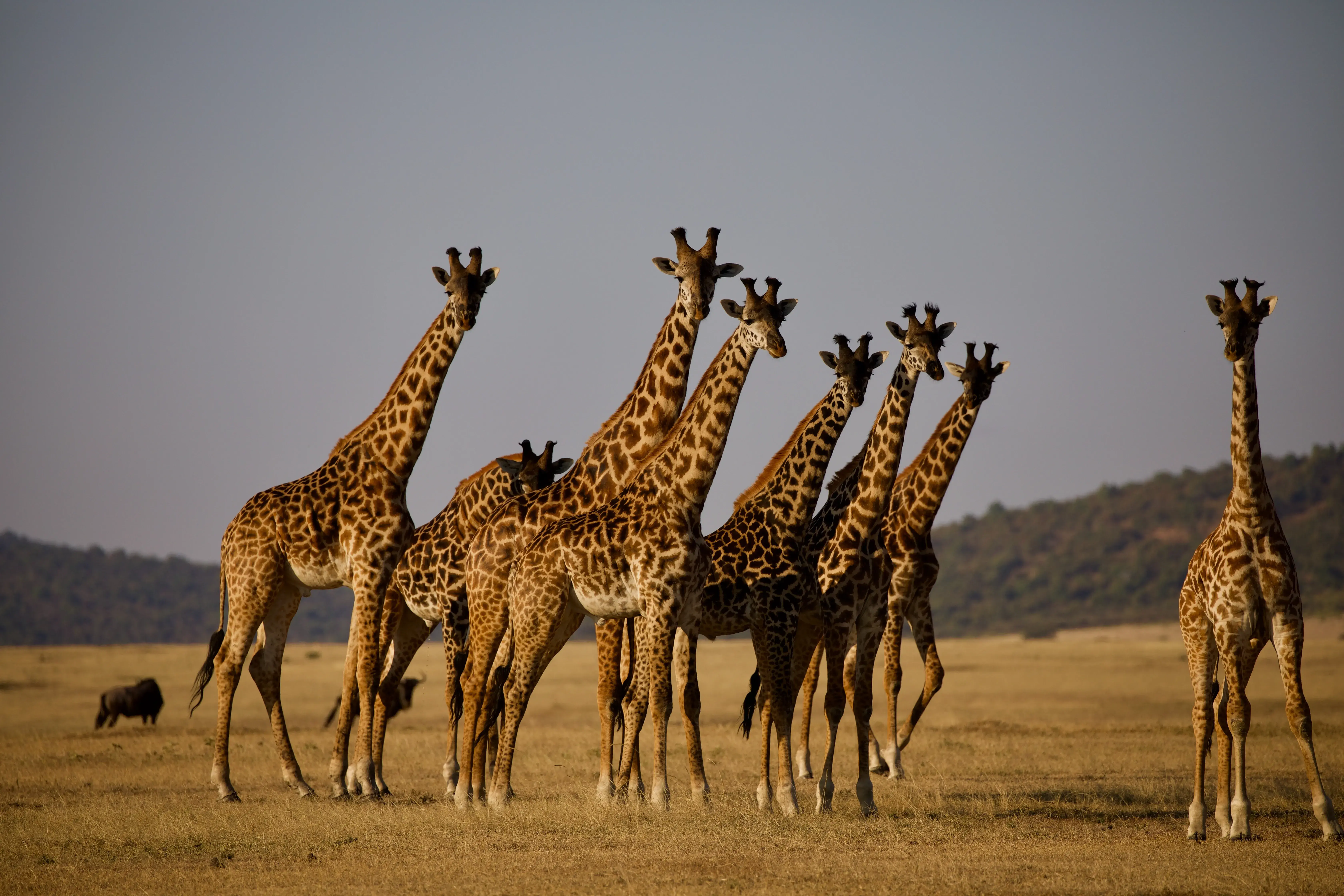
Located just a short drive from the bustling town of Arusha in northern Tanzania, Arusha National Park is a small but incredibly diverse park that offers a microcosm of Tanzania’s natural beauty. Covering approximately 552 square kilometers (212 square miles), this park is known for its varied landscapes, including lush montane forests, open savannahs, and shimmering lakes. Established in 1960, Arusha National Park is often overshadowed by Tanzania's larger parks, but it offers unique attractions and is ideal for those seeking a more intimate safari experience.
Dominating the landscape of Arusha National Park is Mount Meru, Tanzania’s second-highest peak, standing at 4,566 meters (14,980 feet). This dormant volcano offers a challenging but rewarding trekking experience, providing stunning views of the surrounding area and even Mount Kilimanjaro on clear days. The trek to the summit takes hikers through diverse ecosystems, from dense forests teeming with wildlife to alpine meadows. The climb can be done in three to four days, making it a popular choice for those looking to acclimatize before attempting Kilimanjaro.
Arusha National Park may be small, but it is home to a remarkable variety of wildlife. The park’s diverse habitats support species such as giraffes, buffaloes, zebras, and warthogs. Although larger predators like lions are rare, the park is home to leopards and hyenas. One of the park’s highlights is the black-and-white colobus monkeys, which can often be seen leaping between the treetops in the montane forests. Waterbucks and bushbucks are also common, and the park's varied ecosystems provide excellent opportunities for wildlife photography.
The Momella Lakes, a series of shallow alkaline lakes, are a focal point for birdwatching in Arusha National Park. The lakes attract a wide variety of waterbirds, including flamingos, pelicans, and herons. Over 400 bird species have been recorded in the park, making it a paradise for ornithologists. The lakes also provide a tranquil setting for canoeing safaris, where visitors can quietly observe the birdlife and other animals that come to drink and bathe at the water's edge.
Often referred to as the "Little Ngorongoro," the Ngurdoto Crater is a highlight of Arusha National Park. This volcanic caldera is about 3 kilometers (1.9 miles) across and is surrounded by steep, forested walls. The crater floor is a lush swamp and grassland area, home to herds of buffaloes, warthogs, and a variety of antelope species. Although visitors are not allowed to descend into the crater, several viewpoints along the rim offer spectacular vistas of the landscape below.
The montane forests of Arusha National Park are rich with biodiversity, providing a habitat for numerous species of plants and animals. These forests are home to the striking black-and-white colobus monkeys, blue monkeys, and a variety of bird species. The forested areas also contain beautiful waterfalls, such as the Tululusia Waterfall, which is a popular spot for visitors to enjoy a scenic hike and a refreshing break amidst the lush greenery.
The area surrounding Arusha National Park is inhabited by the Meru and Maasai people, both of whom have a rich cultural heritage. Visitors can engage with these communities through cultural tours, learning about their traditional practices, dances, and crafts. These interactions provide a deeper understanding of the local way of life and the symbiotic relationship between the communities and the natural environment.
Arusha National Park is a year-round destination, but the best time to visit depends on your interests. The dry season, from June to October, offers the best conditions for wildlife viewing as animals gather around water sources and the vegetation is less dense. The wet season, from November to May, transforms the park into a lush, green paradise, making it an ideal time for birdwatching and witnessing the park's floral diversity. Each season offers unique opportunities to explore and appreciate the park's natural beauty.
Exploring Arusha National Park can be done through a variety of safari options. Guided game drives offer insights into the park's wildlife and ecosystems, while walking safaris provide a closer connection to nature. Canoeing on the Momella Lakes offers a unique perspective and the chance to see waterbirds and other wildlife up close. For those seeking adventure, trekking Mount Meru is a highlight, offering breathtaking views and a challenging climb. Accommodations range from luxury lodges and tented camps to budget-friendly options, ensuring a memorable stay for every visitor.
Conservation is a key focus of Arusha National Park. Efforts are in place to protect its diverse ecosystems and wildlife populations. Anti-poaching measures, habitat restoration projects, and community involvement programs are critical components of the park's conservation strategy. By engaging local communities in conservation activities and promoting sustainable tourism, the park aims to ensure that its natural and cultural heritage is preserved for future generations. Visitors to Arusha National Park contribute to these efforts, supporting the ongoing protection and preservation of this unique wilderness.
Arusha National Park is conveniently located near the town of Arusha, making it easily accessible by road. The park is only about a 45-minute drive from Arusha and approximately 60 kilometers (37 miles) from Kilimanjaro International Airport. This proximity makes it a popular destination for day trips or the perfect start to a longer safari adventure in Tanzania. Whether you're seeking a quick escape into nature or a more extended exploration, Arusha National Park offers an accessible and rewarding experience.
Ready to embark on your dream adventure? Click the button below to start planning your trip with us!